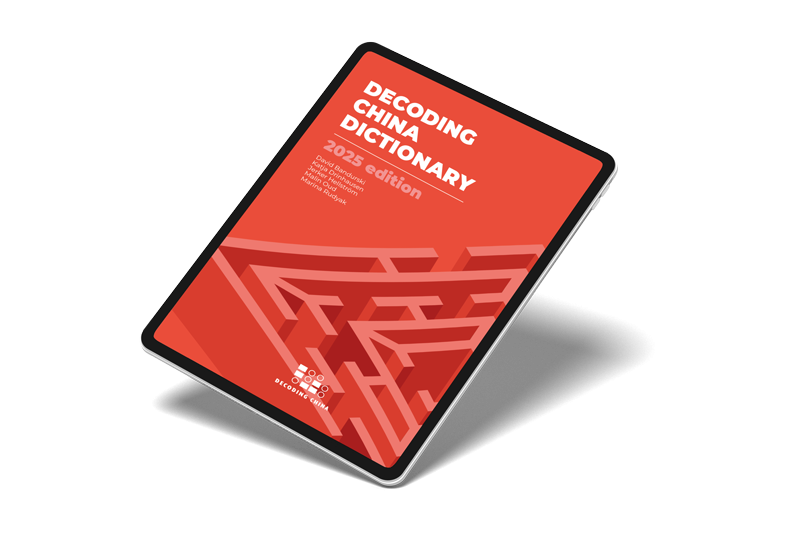
KEY TERM
Democracy
[ 民主 ]
[ 民主 ]
Democracy

Liberal democracies are built on universal suffrage and a regular handover of power. In China’s “whole-process democracy”, the Party is the sole representative of the people, drawing legitimacy from formal consultation and output.
Brief
In the PRC, democracy refers to the Marxist-Leninist system of democratic dictatorship and democratic centralism, in which the CCP is the ultimate representative of the people. This “socialist democracy with Chinese characteristics” is explicitly distinguished from liberal democracy, which is seen as incompatible with China’s unique conditions. While citizens in China can vote for their local representatives, the CCP is constitutionally defined as the sole ruling party and has guiding power over all legislative and state organs.
Despite the lack of a multi-party system, in which access to power is based on periodic elections by universal suffrage, the Party defines itself as inherently democratic. Through “consultative democracy” (协商民主), the CCP formally incorporates the interests of various social groups. Legitimacy is mainly derived from ensuring order, prosperity, and security. Emboldened by successes in delivering economic growth, public health and welfare, the Party increasingly presents this as the superior model internationally. As Xi Jinping stated in 2017: “China’s socialist democracy is the most comprehensive, genuine and effective democracy.”
Analysis
Rooted in Marxist-Leninist ideology, the term “democracy” (民主) has been deeply embedded in Party language since the founding of the CCP, reflected in the original mission to build a “people’s democracy”. In 2019, Xi coined the term “whole-process democracy”, in which the CCP gathers voices from within and outside of the Party, “enabling people to exercise their right to be masters of the state”.
The conceptualisation of China as a democratic state rests on three pillars:
The CCP is democratic, hence China must be too: Under “democratic centralism”, major policy decisions are taken by central Party organs, but are discussed at all administrative levels in formalised “democratic life meetings”. Work regulations issued in 2020 define the “centre” even more clearly and prescribe Xi Jinping Thought as the baseline, thus restricting divergence from top-down ideological guidance.
Chinese citizens can vote: Articles 2 and 3 of China’s Constitution state that citizens exercise their power through the People’s Congresses (China’s legislative organs), which are created through democratic elections. Based on the Election Law, all citizens over 18 can directly vote for delegates up to the county and urban district levels and are eligible to stand in elections. However, candidates for People’s Congresses are generally preselected and the Constitution makes clear that the PRC is a socialist state under the sole leadership of the CCP.
The CCP considers other stakeholders and interests: Formally, the Chinese People’s Political Consultative Conferences serve as the main channel for consultative democracy. Under the label of multiparty cooperation with eight democratic bloc parties and gathering of public feedback (including online), the CCP does solicit opinions from various stakeholders, as long as they do not contest the CCP’s policy priorities.
The ideal of consensus-oriented, efficient democracy under centralised Party leadership is juxtaposed to the confrontational, erratic nature of Western democracy. Now presented as the only suitable system for China, it has not always gone uncontested. The 1989 student protests called for a reform of China’s political system, including elements of liberal democracy. In the aftermath of this movement, the term largely disappeared from political debates in China.
In 2002, the 16th Party Congress included the statement that “inner-party democracy is the life of the Party”. Leading Party thinkers brought the concept back into play. Though limited to a vision of democracy that is compatible with one party rule, in the late 2000s and early 2010s, officials, media and citizens publicly discussed strengthening inner-party democracy and liberalising local government elections to allow a pluralism of positions and include more non-party members. Independent candidates stood for election and had some success. In the 2011 local elections, pro-civil rights candidates attempted to enter the race under the motto “One person, one vote, together we change China”. After Xi rose to power in 2012, “democracy” was included as one of the 12 core socialist values. However, this did not mark a more liberal conceptualisation of democracy. Experiments in participation were shut down, and independent candidates were arrested. In 2013, Document No. 9 defined liberal democracy as a threat to regime stability. Concepts such as constitutional democracy, separation of powers and judicial independence are regularly dismissed as “incorrect ideological thinking” that must be met with resolute resistance. Liberal values were characterised as the root cause of sustained protests in Hong Kong in 2019, ushering in extensive legal and electoral reforms to ensure that only “patriots” supportive of government policy may run for office.
How to cite this article:
Related Articles That Might Interest You


“The Cooperation Principle” – Wang Yi Receives Sweden’s Foreign Minister in Beijing





